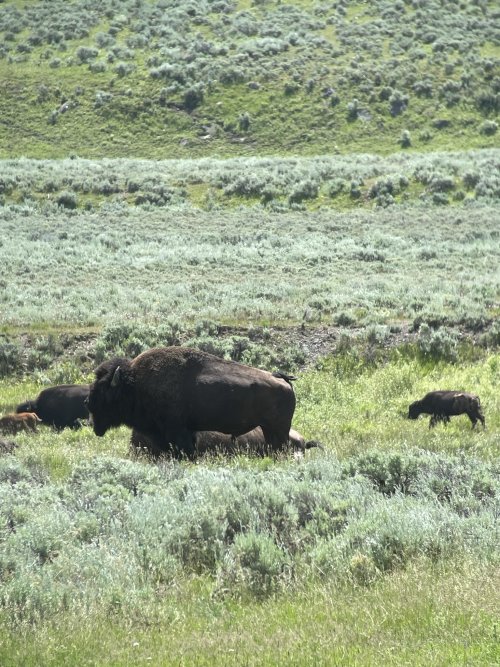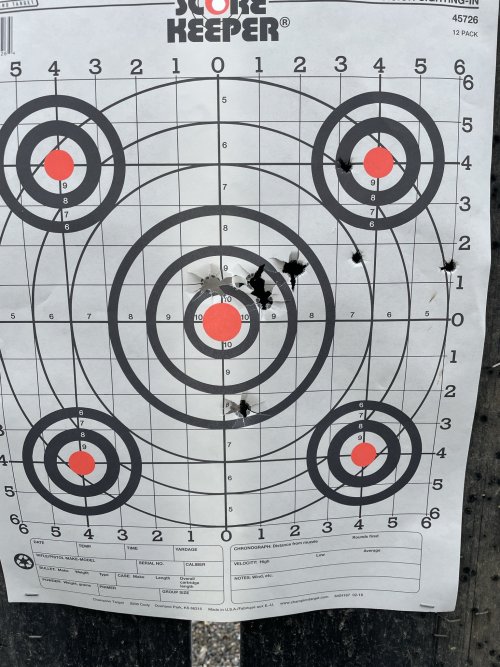Okay, so the thread title is a bit tongue in cheek, but Bison hunts don't get the love I feel like they deserve, and maybe rightfully so. Perhaps we envision them as livestock rather than the incredible Pleistocene Bovine holdovers they are. Maybe our perception of this will change in coming years, maybe not. A lot of it rests on society's seeming intolerance of them, or the perception from hunters and anti-hunters that they are a roadside attraction that can simply be shot from the vehicle. Maybe this thread turns out to prove some of that true, maybe not (a road buff would certainly save a few $$ and lot of sweat). It's certainly no sheep hunt. For me, a bison hunt has always had a great amount of mystique to it. I hope sharing some of this sparks the same for someone else.
May 25th rolled around this last year and my buddy messages me that Utah draw results are out. I pull up my email while sitting at work, and start scrolling down reading the usual “Unsuccessful, Unsuccessful, Unsuccessful, Successful, Unsuccessful, Unsuccessful, Unsuccessful”
Wait- what? Scroll back up:

With Utah's application system requiring a valid hunting license to apply, I have made a habit for the last 9 years or so to apply for pretty much every big game species they offer to "offset" the cost of the hunting license. I've always thought of Utah as my "Once in a Lifetime" state, passing on good opportunity hunts and instead shooting for the stars, knowing I may only hit pay dirt once, if ever, on any of the species. So to see "successful" listed this early into my Utah application game caused a slight bit of panic and manic laughter on my end. Who knows what the random odds are for drawing, but I'll take it! Of the hunts I apply for in Utah, the Books Bison hunt has always held a lot of appeal, specifically the thought of hunting the roadless area.
With a credit card charge confirming that I held the only non-resident tag for my season, and one of five tags total, my summer became occupied with thoughts of the coming fall. Knowing I had from November 1st to the end of January to hunt didn't seem to help things, adding the "paradox of choice" for when I wanted to go, with each time frame offering its own logistical challenge. The phone calls, messages, and emails started in earnest, as did the map scouting. I even learned you can see Yellowstone Bison on Google Earth, although I haven't been able to find them in the Books just yet.
I took a day to become the ultimate Yellowstone tourist- going to the park exclusively to look at Bison- in an attempt to start field judging them. I was probably the only Montana resident pulled over glassing bison this summer. Even the actual tourists were likely confused, but it was good to see some varying bison age classes. The tag is good for any weapon, any bison, but with time to hunt, I would like to find a mature bull. In Yellowstone, I learned to differentiate shooters from non-shooters:
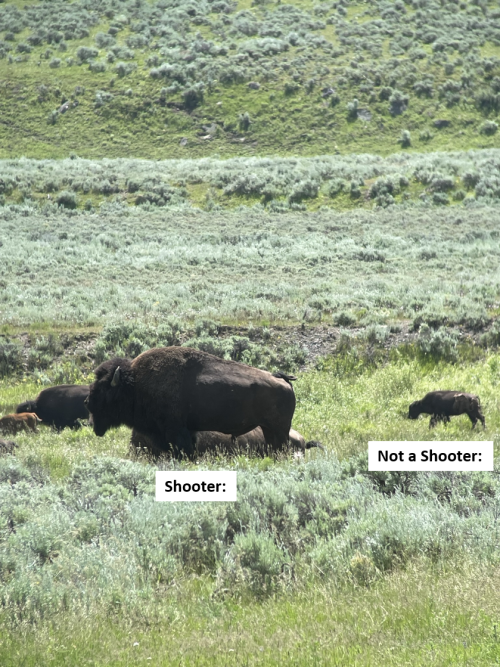
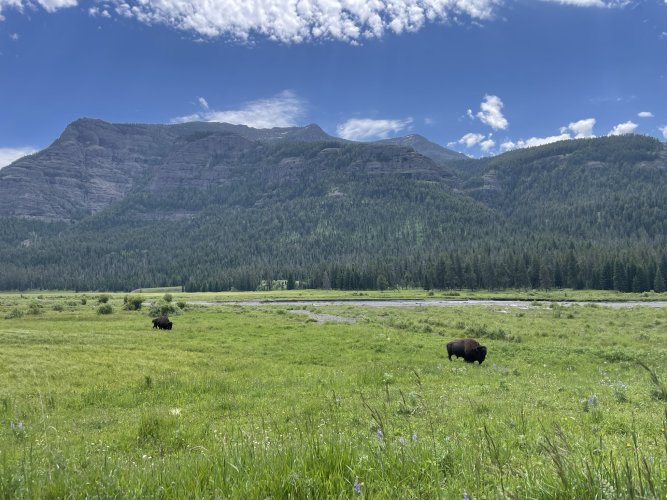
Digging in to Utah's bison history, I learned that Utah is the only western state that considers them "big game animals" and not some form of livestock. They fall under the management of UDWR, not a livestock agency. Unlike Yellowstone bison, who are hazed or culled when they leave the prescribed bounds outside the park, and other herds are confined to their state park, national park, or reservation, Utah's bison are constrained only by the the surrounding landscape. Also of note, when Utah reintroduced bison onto their landscape, they used Bison that were first quarantined, proving to be disease free, and remaining so to this day. They also used only genetically pure bison, with no trace of crossbreeding with cattle, unlike many other "wild" bison herds that had been supplemented with cattle to prevent genetic bottlenecking. With Bison established in the Henry's and on Antelope Island, the state moved several of the excess Henry Mountain Bison into the Book Cliffs, establishing another free roaming, disease free, pure bison population- and with it, another great hunting opportunity!
Come August 24th, my wife and I had a trip planned to Colorado to see friends and for my wife to run in the Telluride Mountain Run. It didn't take much convincing to detour through the Books along the way. I have driven this stretch of highway numerous times, but never while looking at the landscape through the lens of holding a tag for the area.
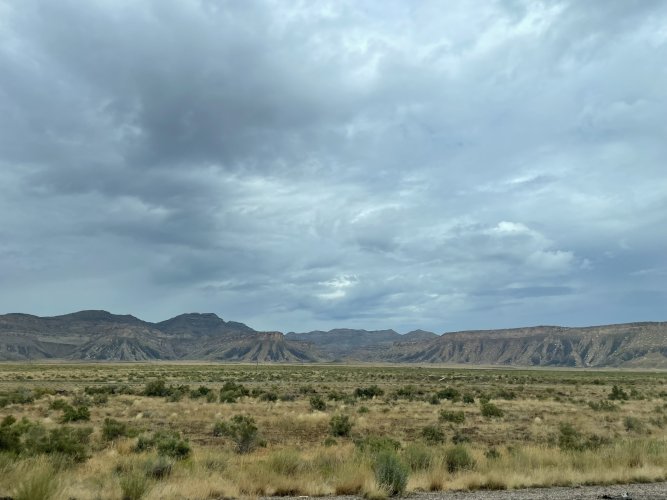
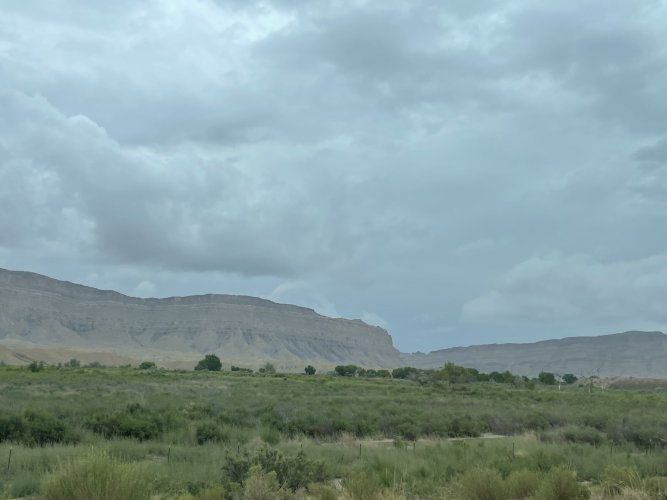
On a tight timeline, I mainly wanted to see what the road conditions were like as well as see the topography first hand to compare it to what I was seeing on Earth and OnX. Having talked to a few friends in the Vernal area that work on the BLM and Forest lands north of my unit frequently, I was concerned with washes from last years epic snow totals, and the subsequent run-off. The roads in were in much better shape than I had anticipated, and we made good time north from Thompson Springs. We stopped to check out the petroglyphs along the way. There was something about seeing Bison painted onto the rocks that certainly added to the excitement to hunt them in the same canyons they roamed prior to being extirpated from the area around the turn of last century.
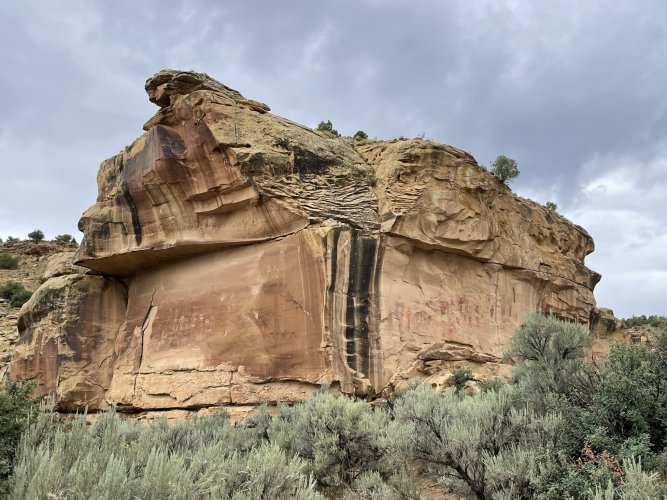
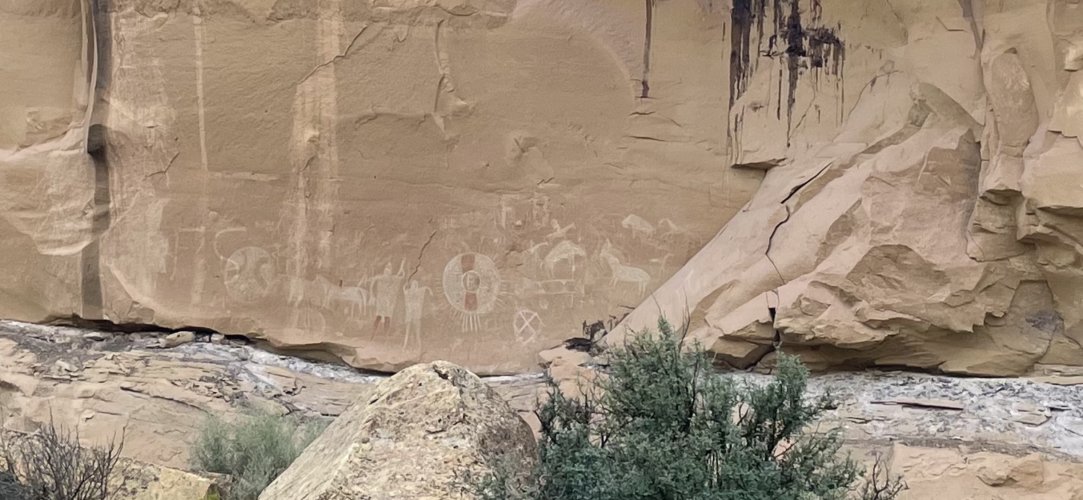
Reaching the main trailhead, it became apparent why everyone I had talked to recommended either having pack horses, or having a contact with pack horses on speed dial.
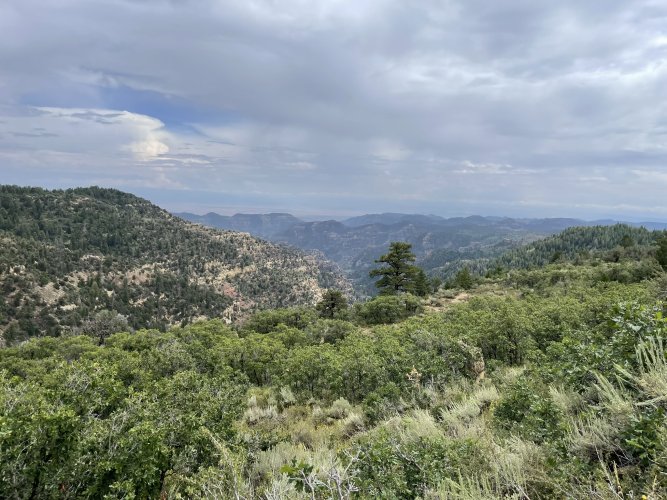
We chatted with an elk hunter coming out on horseback, and were excited to hear that he had seen several bison in the last few days of archery elk hunting. He provided his inReach contact in case I needed a hand packing later in the year if he was in the area. Awfully friendly guy who shared a few other tips regarding the Bison's habits, specifically that of the older bulls.
With a contact on hand for packing, but contingent on him being around, I reached out to a suggested outfit in the area. They stated they could definitely help me out if I found success, and provided a bit more info of their own, like having ~20 game bags for the boned out meat, so as to be able to better balance out loads. My pack load doesn't change much from early deer hunts to late elk hunts, but adding 20 game bags to the pack will certainly take a bite our of my backpack space.
I was a bit bummed to hear that I would need to bone out the ribs, although it solved some of the logistics of fitting them into gamebags, let alone sawing them off the animal. I was also surprised to hear that many hunters this outfit has helped in years past typically only takes the 4 quarters, tenderloins, and backstraps, and not the ribs, brisket, neck, etc. I intend to fill our standing freezer and that of a few friends if I punch my tag.
I dialed in my Dad's Henry 45-70 as the hunt approached. A few years back, he started applying for Bison here in Montana, and I had convinced him this rifle was a wise investment for whenever one of us or a friend drew (optimistic, I know). I'm just the lucky one to try and draw first blood with it! It's shooting around inch and half 3 shot groups at 100 yards with 325gr Hornady FTXs (center three shots pictured below- sighted 1" high). The small scope made a considerable difference, as the standard buckhorn sight moves point of impact about 8" with each "click" at 100 yards. The rifle itself convinced my Dad to put a leather recoil pad on the rifle, as the curved brass buttplate makes for a fair bit of discomfort on range days.
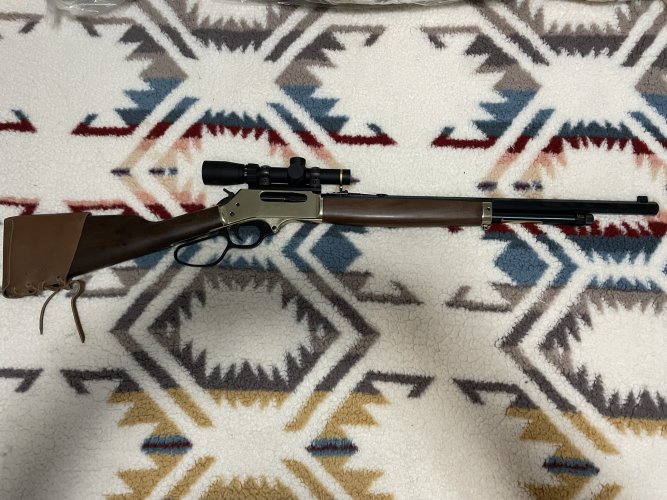
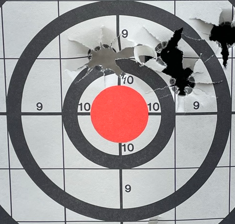
With 3 months to hunt, my concern was showing up in mid to late November (or after) only to find out the prime time to have been out was the start of November, so I'm headed south on the 2nd, with my first day of hunting being the afternoon of the 3rd. I'm fortunate to have my good friend and my dad both joining. My brother in law and another friend are leaning toward being there, but time will tell with their schedules. The forecast looks dry, mild, and for the most part sunny. Our strategy is pretty simple- walk until we find them- as the outfitters I've talked to say they typically ride 50-60 miles with their clients to turn them up. If we get lucky and find one earlier on, all the better. Knowing bison need a fair bit of water each day, and having seen some of the sandstone cliffs that line the creek bottoms, I'm leaning toward hiking the bottoms versus my original plan of running ridges. If we don't find success this go 'round, I've got time set aside in December as well as January.
(Ariel image from UDWR to show some of the terrain)
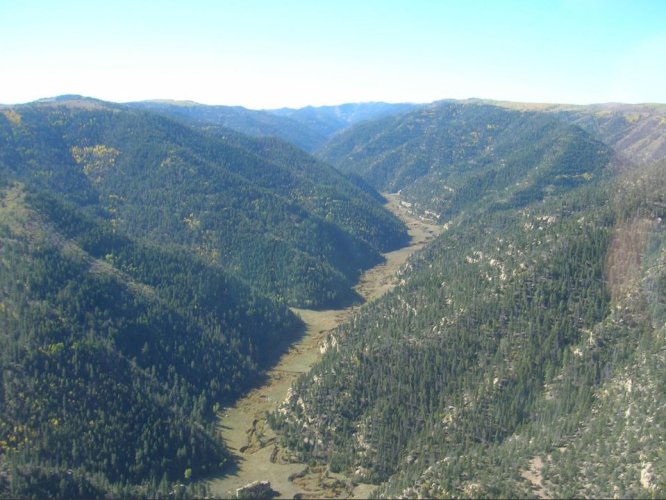
We can hunt all of the Little Creek Roadless, as well as all of the Book Cliffs South, which totals around 1.2 million acres of public land, comprised of BLM and Utah State Land. Although the roadless is just a fraction of this (~58,000 acres), their are several wilderness study areas to get away from vehicle traffic and off the beaten path. I do appreciate the several HuntTalkers who have responded back with info this last several months, and hope I can return the favor sometime!
May 25th rolled around this last year and my buddy messages me that Utah draw results are out. I pull up my email while sitting at work, and start scrolling down reading the usual “Unsuccessful, Unsuccessful, Unsuccessful, Successful, Unsuccessful, Unsuccessful, Unsuccessful”
Wait- what? Scroll back up:

With Utah's application system requiring a valid hunting license to apply, I have made a habit for the last 9 years or so to apply for pretty much every big game species they offer to "offset" the cost of the hunting license. I've always thought of Utah as my "Once in a Lifetime" state, passing on good opportunity hunts and instead shooting for the stars, knowing I may only hit pay dirt once, if ever, on any of the species. So to see "successful" listed this early into my Utah application game caused a slight bit of panic and manic laughter on my end. Who knows what the random odds are for drawing, but I'll take it! Of the hunts I apply for in Utah, the Books Bison hunt has always held a lot of appeal, specifically the thought of hunting the roadless area.
With a credit card charge confirming that I held the only non-resident tag for my season, and one of five tags total, my summer became occupied with thoughts of the coming fall. Knowing I had from November 1st to the end of January to hunt didn't seem to help things, adding the "paradox of choice" for when I wanted to go, with each time frame offering its own logistical challenge. The phone calls, messages, and emails started in earnest, as did the map scouting. I even learned you can see Yellowstone Bison on Google Earth, although I haven't been able to find them in the Books just yet.
I took a day to become the ultimate Yellowstone tourist- going to the park exclusively to look at Bison- in an attempt to start field judging them. I was probably the only Montana resident pulled over glassing bison this summer. Even the actual tourists were likely confused, but it was good to see some varying bison age classes. The tag is good for any weapon, any bison, but with time to hunt, I would like to find a mature bull. In Yellowstone, I learned to differentiate shooters from non-shooters:


Digging in to Utah's bison history, I learned that Utah is the only western state that considers them "big game animals" and not some form of livestock. They fall under the management of UDWR, not a livestock agency. Unlike Yellowstone bison, who are hazed or culled when they leave the prescribed bounds outside the park, and other herds are confined to their state park, national park, or reservation, Utah's bison are constrained only by the the surrounding landscape. Also of note, when Utah reintroduced bison onto their landscape, they used Bison that were first quarantined, proving to be disease free, and remaining so to this day. They also used only genetically pure bison, with no trace of crossbreeding with cattle, unlike many other "wild" bison herds that had been supplemented with cattle to prevent genetic bottlenecking. With Bison established in the Henry's and on Antelope Island, the state moved several of the excess Henry Mountain Bison into the Book Cliffs, establishing another free roaming, disease free, pure bison population- and with it, another great hunting opportunity!
Come August 24th, my wife and I had a trip planned to Colorado to see friends and for my wife to run in the Telluride Mountain Run. It didn't take much convincing to detour through the Books along the way. I have driven this stretch of highway numerous times, but never while looking at the landscape through the lens of holding a tag for the area.


On a tight timeline, I mainly wanted to see what the road conditions were like as well as see the topography first hand to compare it to what I was seeing on Earth and OnX. Having talked to a few friends in the Vernal area that work on the BLM and Forest lands north of my unit frequently, I was concerned with washes from last years epic snow totals, and the subsequent run-off. The roads in were in much better shape than I had anticipated, and we made good time north from Thompson Springs. We stopped to check out the petroglyphs along the way. There was something about seeing Bison painted onto the rocks that certainly added to the excitement to hunt them in the same canyons they roamed prior to being extirpated from the area around the turn of last century.


Reaching the main trailhead, it became apparent why everyone I had talked to recommended either having pack horses, or having a contact with pack horses on speed dial.

We chatted with an elk hunter coming out on horseback, and were excited to hear that he had seen several bison in the last few days of archery elk hunting. He provided his inReach contact in case I needed a hand packing later in the year if he was in the area. Awfully friendly guy who shared a few other tips regarding the Bison's habits, specifically that of the older bulls.
With a contact on hand for packing, but contingent on him being around, I reached out to a suggested outfit in the area. They stated they could definitely help me out if I found success, and provided a bit more info of their own, like having ~20 game bags for the boned out meat, so as to be able to better balance out loads. My pack load doesn't change much from early deer hunts to late elk hunts, but adding 20 game bags to the pack will certainly take a bite our of my backpack space.
I was a bit bummed to hear that I would need to bone out the ribs, although it solved some of the logistics of fitting them into gamebags, let alone sawing them off the animal. I was also surprised to hear that many hunters this outfit has helped in years past typically only takes the 4 quarters, tenderloins, and backstraps, and not the ribs, brisket, neck, etc. I intend to fill our standing freezer and that of a few friends if I punch my tag.
I dialed in my Dad's Henry 45-70 as the hunt approached. A few years back, he started applying for Bison here in Montana, and I had convinced him this rifle was a wise investment for whenever one of us or a friend drew (optimistic, I know). I'm just the lucky one to try and draw first blood with it! It's shooting around inch and half 3 shot groups at 100 yards with 325gr Hornady FTXs (center three shots pictured below- sighted 1" high). The small scope made a considerable difference, as the standard buckhorn sight moves point of impact about 8" with each "click" at 100 yards. The rifle itself convinced my Dad to put a leather recoil pad on the rifle, as the curved brass buttplate makes for a fair bit of discomfort on range days.


With 3 months to hunt, my concern was showing up in mid to late November (or after) only to find out the prime time to have been out was the start of November, so I'm headed south on the 2nd, with my first day of hunting being the afternoon of the 3rd. I'm fortunate to have my good friend and my dad both joining. My brother in law and another friend are leaning toward being there, but time will tell with their schedules. The forecast looks dry, mild, and for the most part sunny. Our strategy is pretty simple- walk until we find them- as the outfitters I've talked to say they typically ride 50-60 miles with their clients to turn them up. If we get lucky and find one earlier on, all the better. Knowing bison need a fair bit of water each day, and having seen some of the sandstone cliffs that line the creek bottoms, I'm leaning toward hiking the bottoms versus my original plan of running ridges. If we don't find success this go 'round, I've got time set aside in December as well as January.
(Ariel image from UDWR to show some of the terrain)

We can hunt all of the Little Creek Roadless, as well as all of the Book Cliffs South, which totals around 1.2 million acres of public land, comprised of BLM and Utah State Land. Although the roadless is just a fraction of this (~58,000 acres), their are several wilderness study areas to get away from vehicle traffic and off the beaten path. I do appreciate the several HuntTalkers who have responded back with info this last several months, and hope I can return the favor sometime!




